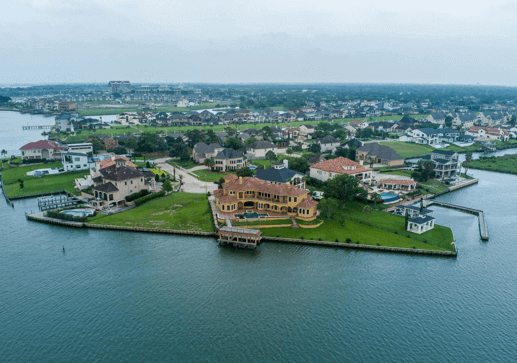Waterfront properties have long been considered a premium asset, but many investors ask a critical question: Does waterfront land appreciate faster? The simple answer is that while market conditions vary, historical data shows waterfront lots often command a price premium of 40% or more compared to similar inland parcels. The fundamental principle of limited supply drives this value growth—they simply aren’t making any more of it. However, factors like flood risk, insurance costs, and access to infrastructure also play a significant role in determining a property’s long-term value. So, does waterfront land appreciate faster in all situations? Not always, but understanding the key drivers can help you make a smarter investment decision. Steve Daria and Joleigh, well-known real estate investors and cash land buyers, have seen firsthand how these trends impact sellers and buyers. They specialize in providing fast, transparent cash offers based on a clear understanding of your property’s unique value. To get expert guidance on your specific waterfront parcel and explore a no-obligation cash offer, book a free discussion with them today.
Key Points
- Waterfront Land Typically Holds Higher Long-Term Value: Waterfront properties consistently command premium valuations in the real estate market, primarily due to their unparalleled locations and inherent scarcity. This scarcity usually supports steady appreciation over time.
- Lifestyle Appeal Drives Strong Demand: Many buyers are drawn to waterfront land for views, recreation, and privacy. This lifestyle factor keeps demand high, especially in vacation or retirement areas.
- Location Greatly Impacts Appreciation Rates: Not all waterfronts are equal—land on lakes, rivers, or oceans may appreciate at different rates depending on the area’s growth, infrastructure, and desirability. For example, land in growing coastal towns tends to rise faster than in remote areas.
- Climate and Risk Factors Affect Value: Flood zones, erosion, and storm risk can slow appreciation or even reduce value over time. Buyers often pay more for land that’s considered low-risk and insurable.
- Zoning and Usage Rights Matter: Land with clear building rights, dock access, or relaxed zoning tends to be more valuable. These features can accelerate appreciation as development becomes easier.
What makes waterfront land different from other types of real estate?
Waterfront land is fundamentally different from other real estate primarily due to its fixed, limited supply and direct access to water.
Unlike inland parcels, the scarcity of coastline and lakefront properties drives significant demand for the lifestyle and recreational benefits they offer.
This scarcity is why waterfront lots often command a major price premium over non-waterfront land.
The constant question for investors is, “Does waterfront land appreciate faster?” as a result of these unique qualities? While it often does, its value is also shaped by distinct challenges and considerations that don’t typically affect other properties.

For instance, waterfront land is subject to stricter environmental regulations, including specific building setbacks from the water’s edge that can limit development.
Owners must also contend with higher risks such as flooding and shoreline erosion, which lead to more expensive insurance policies.
Furthermore, providing utility services like water, sewer, and power can be more complex and costly in these locations.
Ultimately, the long-term value is uniquely tied to the quality of the water frontage and its stability over time, making it a specialized asset class.
Get Started: Get Your Cash Offer Below…
We are direct land buyers. There are no commissions or fees and no obligation whatsoever. Start below by sharing where your property is and where we can send your offer…
Do all waterfront properties increase in value at the same rate?
No, all waterfront properties do not increase in value at the same rate, as appreciation depends heavily on numerous local and property-specific factors.
The answer to the question, “Does waterfront land appreciate faster?” is often yes, but this growth varies significantly by location and the type of water body, such as the ocean, a lake, or a river.
Key drivers include the quality of the water frontage, the view, ease of access, local job growth, and nearby amenities.
Properties with stable shorelines and desirable features in high-demand areas tend to see much faster value growth.
Conversely, land in high-risk flood zones, areas prone to erosion, or remote locations with limited access may appreciate slowly or experience more volatility.
High insurance costs and strict building regulations can also temper the rate of appreciation for certain parcels.
While upgrades like adding a dock or clearing access can boost value, these improvements are often constrained by local rules.
Therefore, it is essential to review local comparable sales, professional surveys, and official flood maps to set realistic expectations for any specific waterfront property.
Are there any major risks associated with buying waterfront land?
- Flooding and Storm Damage: Waterfront land is more likely to be in flood zones or areas hit by hurricanes. This increases the chances of property damage, potentially leading to expensive repairs or insurance costs.
- Erosion and Shoreline Loss: Over time, waves, tides, or heavy rain can slowly wash away your land. This risk can affect long-term value, especially when asking, “Does waterfront land appreciate faster?” — because erosion can reduce usable space and hurt future resale value.
- Higher Insurance and Maintenance Costs: Owning land near water often means paying for special insurance like flood or wind coverage. Humidity, salt air, and water exposure can also result in elevated maintenance costs.
- Strict Zoning and Environmental Rules: If you’re wondering, “Does waterfront land appreciate faster?” remember that heavy restrictions can slow growth in value. Rules about building near wetlands or shorelines may limit what you can do with the land.
- Access or Usage Limitations: Not all waterfront land includes private access to the water. Always check legal documents to confirm what you’re allowed to use or build.

How much more does waterfront land typically cost?
Waterfront land typically costs significantly more than similar inland parcels, with premiums commonly ranging from 20% to well over 100%.
This wide range depends on many factors, including the location, the type of water body, and the quality of the view and access.
Prime oceanfront or large-lake frontage with stable shorelines often commands the highest prices, while lots on canals, ponds, or near wetlands may have a lower premium.
The essential question for buyers, “Does waterfront land appreciate faster?” is closely tied to these initial cost drivers and the principle of scarcity.
However, the purchase price is only part of the total cost of ownership you should consider.
You must also account for potentially expensive flood insurance, the cost of building or maintaining seawalls, and fees for dock permits.
Stricter building setbacks and other regulations can also increase development expenses and affect the land’s buildability.
While high lifestyle demand drives up pricing, risks like erosion and storm damage can temper a property’s value.
To estimate a realistic price, it’s crucial to analyze recent local comparable sales, review surveys, and check official flood maps.
How do I find accurate sales data for waterfront properties?
- Check Local Property Appraiser Websites: Most Florida counties, including those near waterfront areas, have online property records. Search by address or parcel number to find details on past sales, lot dimensions, and property taxes.
- Use Real Estate Websites with Specific Filters: Sites like Zillow, Redfin, or Realtor.com allow you to filter by property type, location, and waterfront features. This helps answer questions like “Does waterfront land appreciate faster?” by comparing sold prices over time.
- Consult a Local Real Estate Agent for Comparable Sales: An experienced agent can access MLS data and provide recent comparable sales. They may also know of off-market deals or upcoming listings.
- Review Market Reports and Sales Trends: Local real estate offices often release monthly or quarterly reports that track land values. These reports can give you insight into “Does waterfront land appreciate faster?” in your specific area.
- Hire a Licensed Appraiser: An appraiser provides a detailed property value based on location, condition, and recent sales. This is one of the most accurate ways to get reliable pricing data.
Does rental income potential make waterfront land a better investment?
The potential for rental income can certainly make waterfront land a better investment, but it requires careful analysis beyond just the gross revenue.
High demand for unique vacation experiences often allows owners to charge premium nightly rates, generating strong cash flow, especially during peak seasons.
This income stream can significantly enhance your total return by helping to offset ownership costs, such as taxes and insurance.
While many ask, “Does waterfront land appreciate faster?” the added cash flow from rentals can provide a financial cushion regardless of market cycles.
However, you must subtract significant expenses like platform fees, higher maintenance costs, and potentially steep insurance premiums from your calculations.
Seasonality can also lead to vacant periods, while local regulations might restrict or even prohibit short-term rentals, so verifying rules is essential.
Furthermore, infrastructure such as docks, reliable utilities, and safe access is often necessary to attract renters and may require costly permits.
The best rental properties are typically near popular amenities and have stable, accessible shorelines.
To unlock your property’s full potential and receive a fair cash offer, schedule a complimentary consultation with an experienced land buying team for expert guidance on its value.
**NOTICE: Please note that the content presented in this post is intended solely for informational and educational purposes. It should not be construed as legal or financial advice or relied upon as a replacement for consultation with a qualified attorney or CPA. For specific guidance on legal or financial matters, readers are encouraged to seek professional assistance from an attorney, CPA, or other appropriate professional regarding the subject matter.
